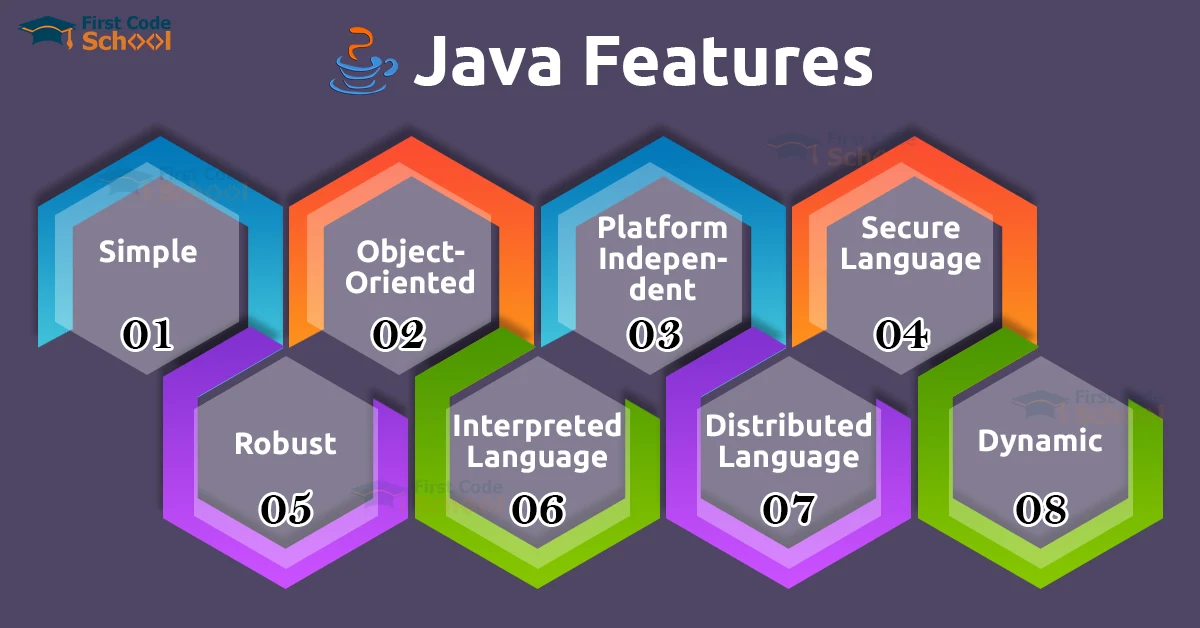Features of Java Programming Language:
Here are the key features of Java programming language that make it widely popular:
- Platform Independence – Develop Once, Execute Anywhere (DOWEA).
- Simple and Easy to Learn – Clear syntax, akin to C/C++.
- Robust – Strong memory management and exception handling.
- Secure – Bytecode verification and no explicit pointers.
- Portable – Works across different platforms without modification.
- High Performance – Just-In-Time (JIT) compiler optimizations.
- Multithreading – Allows simultaneous task execution.
- Distributed Computing – Supports RMI and CORBA for distributed apps.
- Dynamic and Extensible – Links classes dynamically at runtime.
- Rich API – Libraries for networking, data structures, GUI, etc.
- Automatic Garbage Collection – Manages memory automatically.
- Scalable – Suitable for both small and enterprise-level applications.
- Open-Source – Free with extensive community support.
- Object-Oriented – Focuses on the utilization of objects and classes, integrating principles such as inheritance and polymorphism.
1. Platform Independence
- You can write your code once, and it can run anywhere.
- Java turns your code into bytecode.
- This bytecode can run on any device with a Java Virtual Machine.
2. Simple and Easy to Learn
- Java has a clean and easy-to-understand syntax, making it simple for beginners who are already familiar with C or C++.
- Java is a high-level programming language i.e we will write English statement to write the code and readability of these high-level programming language is high, hence Java is considered as a simple.
3. Robust
- Robust is one of the main features of java programming language,Java is having automatic memory management system,Java will never utilize CPU resources like RAM
- Java uses its own architecture called JVM. It is responsible to manage the memory automatically.
4. Secure
- The Java programming language is a highly secured programming language. Because once we write a code compiler converts our code into bite code and file extension will be in a (.class) file.
- This (.Class) file will not be understood by anyone once after JVM decodes, it into machine, understandable language
- Java provides built-in security features such as:
- Bytecode verification to detect malicious code.
- No explicit use of pointers, reducing unauthorized memory access.
- A Security Manager to define access policies for classes.
5. Portable
- Java’s platform independence ensures that its applications are portable across various systems.
- There is no requirement to alter the code for different platforms.
- The concept of Java being portable signifies that you can write the code once and execute it anywhere.
- Java programs are transformed into bytecode, which can be easily executed on any machine.
6. High Performance
- Java’s Just-In-Time (JIT) compiler, which converts bytecode into machine code while it’s running, allows for optimal performance.
- Despite generally being slower than C++, Java’s performance has significantly improved since the introduction of contemporary JVMs.
7. Multithreading
- Because Java offers multithreaded programming, programmers can use it to carry out several activities at once.
- Applications become responsive and efficient as a result.
- Threads are a notion used in Java. This idea can help us do multitasking.
- We favored the low-cost thread technique for multitasking.
8. Distributed Computing
- Java enables the creation of networked applications through the utilization of tools such as CORBA and RMI (Remote Method Invocation).
9. Dynamic and Extensible
- Classes can be dynamically linked at runtime in Java.
- It allows you to load new classes without having to recompile the entire program.
10. Rich API
Java has a rich set of libraries for:
- Socializing
- I/O for files
- Data structures Data Structures
- Database connectivity
- Swing, JavaFX, and GUI development
11. Automatic Garbage Collection
- Java incorporates an automatic garbage collection mechanism that oversees memory usage by recovering memory from objects that are no longer in use.
12. Scalable
- Spring, Hibernate, and Java EE are frameworks that make Java suitable for both small-scale applications and large-scale solutions.
13. Open-Source and Community Support
- Frameworks such as Spring, Hibernate, and Java EE enhance Java’s capability, making it appropriate for applications of varying sizes, from small-scale projects to extensive enterprise solutions.
14. Object-Oriented
- The language emphasizes the use of objects and classes, incorporating principles such as inheritance and polymorphism.

